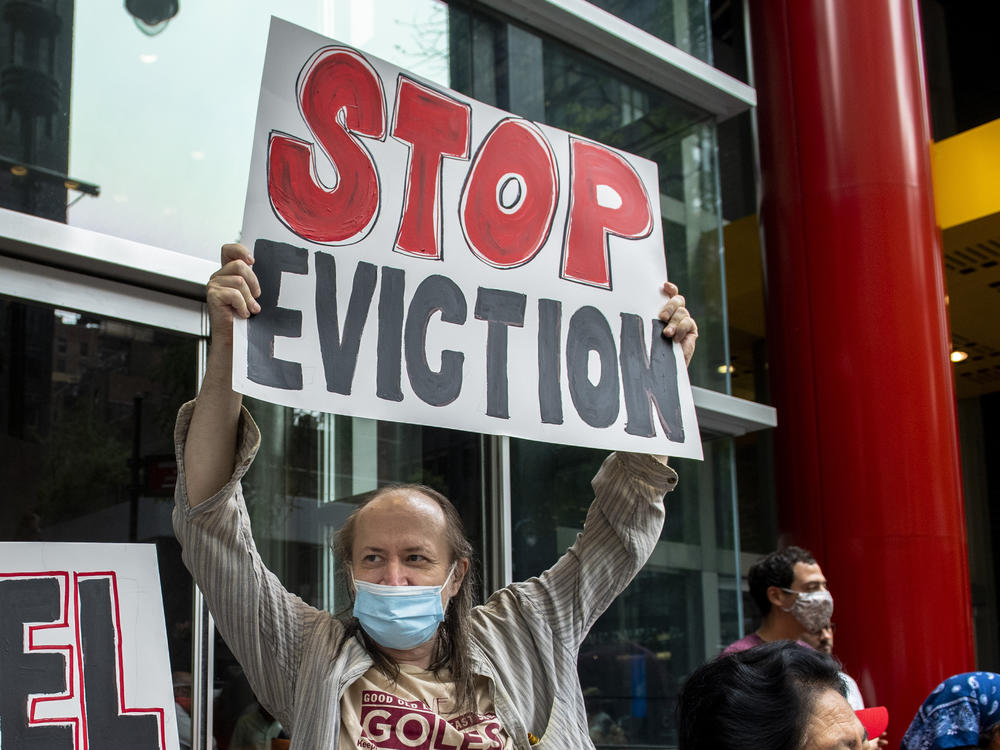Section Branding
Header Content
Evictions rising even as rental help from Congress reaches millions of people
Primary Content
When a U.S. Supreme Court decision struck down a federal eviction moratorium many experts and housing advocates feared a tsunami of evictions would quickly follow. That isn't quite happening, but eviction filings are rising sharply in many parts of the country.
So a race is underway to get rental assistance money from Congress to people who fell behind on rent during the pandemic before landlords evict them from their homes. And the race is getting more intense. After a very slow start, the money from Congress is finally reaching more people.
"This means that kids are able to stay in school, their parents are able to stay in their jobs," says Wally Adeyemo, the Deputy U.S. Treasury Secretary. He is overseeing 500 state and local programs that are distributing $47 billion from Congress to pay people's back rent and prevent evictions.
Adeyemo says more than $10 billion dollars has reached about 2 million households to help them pay their back rent and avoid eviction.
In August and September the programs got more money to people than in the previous 7 months combined.
"It's very encouraging to see the progress we've made over the last several months as the national eviction moratorium has ended," Adeyemo says
Still, a lot more people need the help and many are running out of time. More than 8 million people are behind on rent and are now at greater risk of losing their homes because that federal moratorium is no longer protecting them.
Peter Hepburn, a researcher at the Eviction Lab at Princeton University, says throughout much of pandemic eviction filings were only about half their normal level, even though twice as many people were behind on their rent. But not anymore.
"When we look at the first two weeks of October they were 25% higher than two months ago," Hepburn says. That includes some states and cities that still have their own local protections blocking or limiting evictions, such as in New York and California.
In places with no eviction bans, landlords are now filing many more eviction cases. He says take Houston for example.
"We've seen really kind of astronomical increases in the number of eviction cases being filed [in Houston] over the last few weeks." Hepburn says evictions in Houston have doubled since the federal eviction moratorium was struck down, going from about half of normal back up to normal historical levels of evictions. And Hepburn says that's despite a local emergency rental assistance program that's been working well to get money from Congress to people who need it.
Of course, returning to a normal pace of evictions with twice as many people as normal behind on rent is far from the catastrophic wave of evictions that some experts worried about. But Hepburn says that trend line of rising evictions is troubling.
"There is reason to be concerned that those numbers will continue to increase despite the improved efficiency of these rental assistance programs," Hepburn says.
Part of the problem is that there are currently 500 state and local rental assistance programs trying to distribute this money from Congress. Many are operating effectively but others are in disarray. Applications get clogged in systems that ask people for too many documents. And overly strict rules can block families from getting the help.
Tawayna Broxton lives in Marietta, Georgia, with her 13-year-old daughter and adult son. "The landlord is saying, 'we just want you out, you need to get out right now,'" she says.
After falling behind on rent during the pandemic, Broxton says she was approved for help by a local rental assistance program. But she says her landlord won't cooperate with the program. Court documents show the landlord has been pressing ahead to try evict the family. An attorney for the landlord had no comment.
In situations like this, the Treasury Department has been encouraging rental assistance programs to issue checks directly to renters so they can get their back rent paid and avoid eviction. But the Cobb County website in Georgia where Broxton lives tells renters that checks will only be issued to landlords, not renters. That means the county program won't give people facing eviction that federal money to pay their back rent if landlords refuse to respond or take part.
So Broxton says she's afraid she will soon be evicted and says she and her 13-year-old daughter have no place else to go.
"We would have to go to a homeless shelter," Broxton says. "And I don't want my kids to face that. I would have a nervous breakdown."
A spokesman for Cobb County said that the county's board of commissioners wants to make sure the rental assistance money is "accounted for properly," and that's why the county program won't issue checks directly to renters. But the spokesman said renters can apply for help through the state level program which is also distributing the money from Congress and it can issue checks directly to renters.
Broxton says nobody told her about that. "I'm shocked," she says. "They should have told us." She says she is now attempting to get help through the state program.
Copyright 2021 NPR. To see more, visit https://www.npr.org.
Bottom Content

